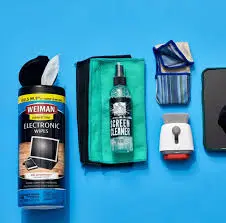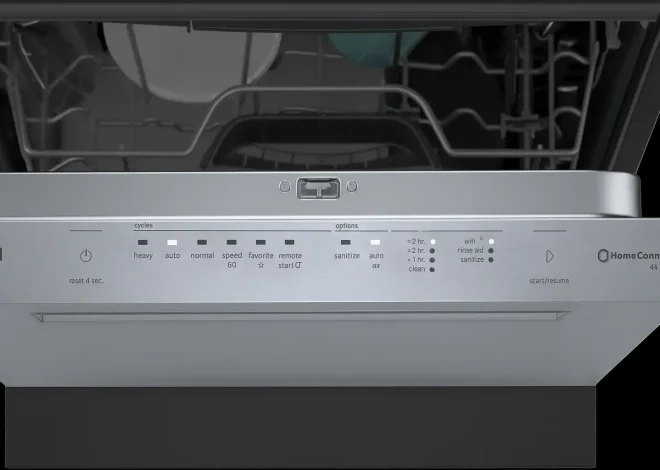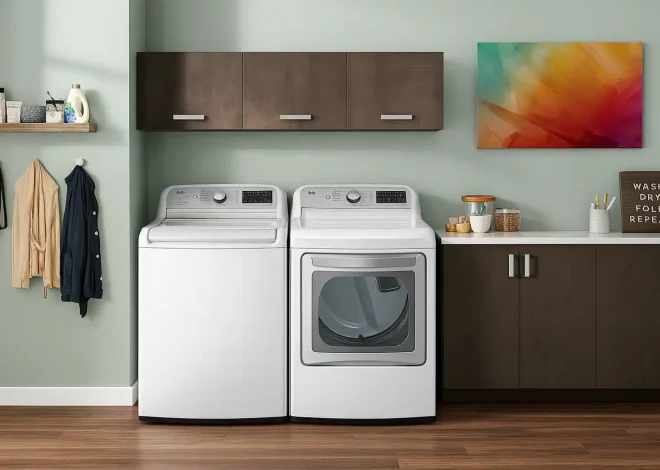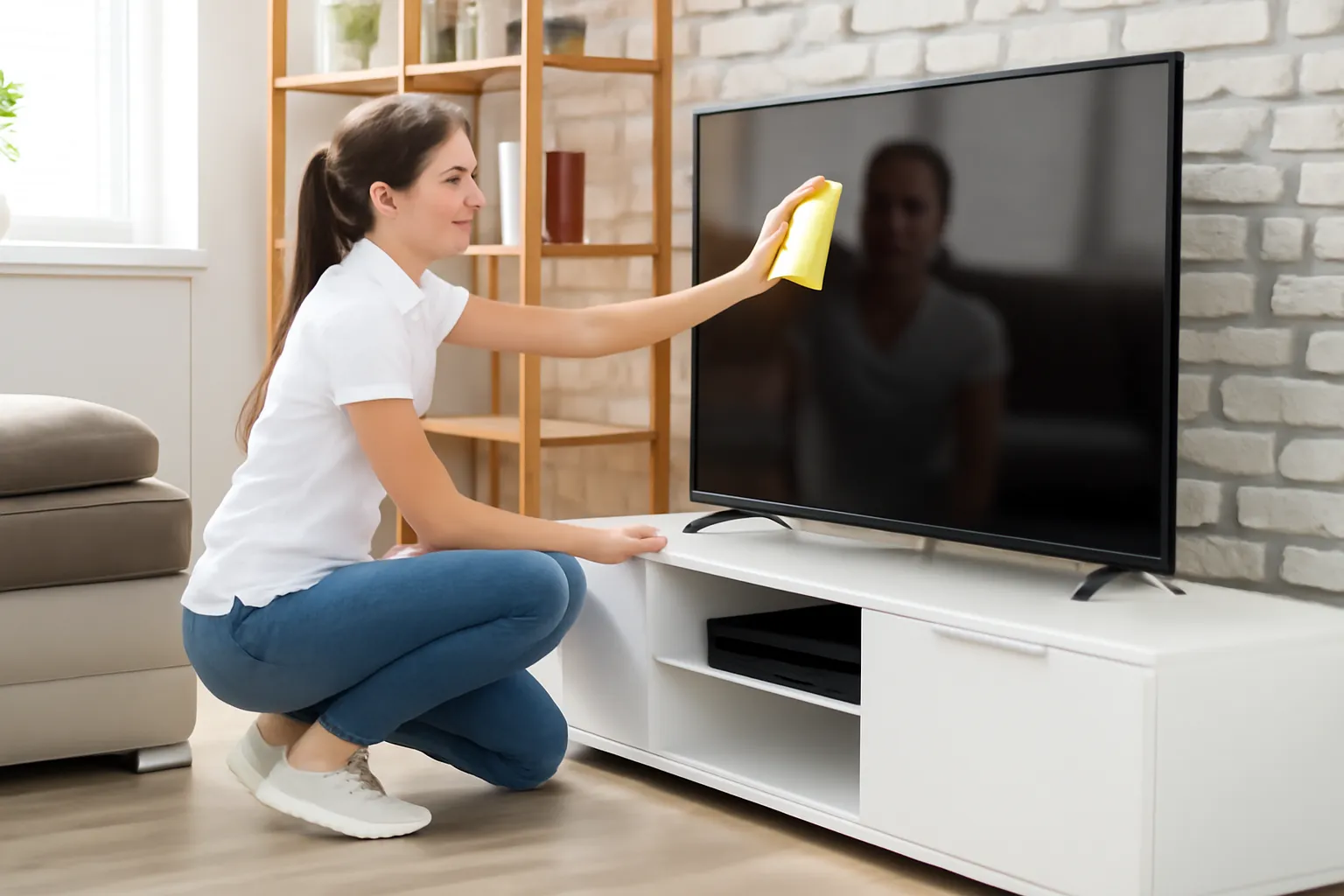
Can You Use Windex on TV? Here’s the Safe Way to Clean Your Screen
If you ask what to use to clean a TV screen, I’d say go for a cloth slightly dampened with distilled water or a dedicated safe cleaner. From personal experience, taking the extra step to use the right tools really helps prolong your screen’s life. If you’re unsure how to clean the TV screen, think gently, dry, and chemical-free. For trusted cleaning products and tips, check out Best Vouch.
How to Safely Clean Your TV and Monitor Screens?
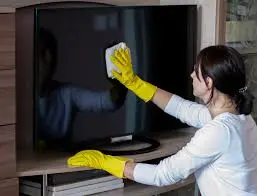
From my own experience cleaning many screens from old CRT TVs to new OLED ones I learned it’s important to be careful with what you use on a television screen. A flat panel tv screen is not like a regular window or mirror. New flat screen tv types, like LCD and OLED, have special layers that can get damaged by strong cleaners.
One time, I used a glass cleaner on my computer screen, and it left marks that never went away. That’s when I learned that window cleaner is not good for a screen tv screen. Windex works great on glass, but not on a monitor or flat screen.
These screens have soft surfaces and special coatings that don’t like harsh chemicals. It’s better to use a soft cloth with a little bit of water or a cleaner made just for screens. Whether it’s a fancy OLED TV, a simple LCD, or a small computer screen, being gentle helps your screen stay clean and clear for the best picture.
What Types of Screens Are Commonly Used in TVs?
Many people wonder if it’s okay to use Windex on a TV monitor, especially when the screen gets dirty. From my own experience cleaning different TVs, I’ve learned that it really depends on the type of screen you have. Most new TVs, like a flat screen tv or a smart tv screen, use LED, LCD, or OLED screens.
These are not like the old CRT TVs or glass screens found on a computer monitor. A lcd tv screen or led tv screen may look strong, but they can be easily damaged by strong cleaners like Windex. If you have a led lcd tv screen, it’s best to avoid spraying anything directly on it. Always check what kind of TV you have before cleaning the screen, or you might harm it.
How Do Different Screens React to Cleaning Chemicals?
I’ve seen a lot of people damage their TVs by using the wrong cleaning products. Spraying Windex or other cleaners with harsh chemicals like ammonia, alcohol, or lauramine oxide can cause permanent damage to your TV. Can you use Windex on TV? The answer is no, as these chemicals can harm the screen panels, especially on newer TVs like OLED and LCD models. Even older CRT TVs can get damaged over time with strong cleaners.
If you’re asking what clean tv screen safely or what clean tv screens without harm, the best way is to avoid chemicals. Can you use Windex on TV? It’s better to steer clear of it. The safest method for cleaning a TV screen is using a soft cloth, like microfiber, and a little bit of water if needed. When people ask me how to clean a flat screen tv monitor, I always say to be gentle. A clean screen is nice, but not if it means damaging it.
Why Is It Important to Use Safe Cleaning Methods?
What Is Windex and Its Primary Ingredients?
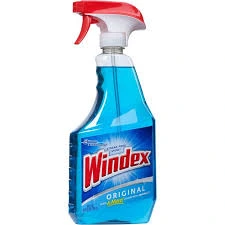
As someone who’s always reaching for a quick fix to make my electronics sparkle, I used to think Windex was the perfect window cleaner for everything until I learned better. While Windex is a powerful cleaning agent, it’s not just water and a pleasant scent. It contains ammonia, alcohol, and lauramine oxide, all of which make it great for glass but risky for screens.
Most people think if a cleaning product works wonders on windows, it should be a decent screen cleaner too. But that’s not the case. TVs are sensitive to harsh chemicals. Using a regular window cleaner like Windex might leave streaks or even damage the screen’s protective layer.
From my own trial-and-error cleaning days, I’ve learned that electronics need products specifically made as a screen cleaner, not just any household cleaning agent. So next time you’re tempted to spray that familiar blue bottle, pause and reach for something screen-safe instead.
What Cleaning Agents Are Found in Windex?
I remember the first time I reached for Windex to clean my new flat-screen TV. I thought, “If it works wonders on glass, why not the TV?” But I soon realized that window cleaners like Windex contain more than just sparkle-inducing ingredients; they’re packed with powerful stuff that isn’t great for screens.
Typical window cleaner ingredients include ammonia, alcohol, and lauramine oxide. These might sound like science-lab terms, but they’re what give Windex that sharp scent and streak-free shine. However, these harsh chemicals are exactly why it’s not safe for screens. A TV screen is more delicate than a glass window using a strong screen cleaning agent made for hard surfaces can lead to permanent damage like discoloration or fading.
Many people confuse window cleaners with screen-safe products, but if you check the label closely, most Windex bottles even warn against use on electronic screens. Stick to products specifically labeled for screen use, or just use a dry microfiber cloth if you want to play it safe.
Are There Any Risks Associated with Using Windex?
If you’re wondering, can you use Windex on TV, you’re not alone—many people still reach for that familiar blue bottle. From personal experience cleaning older CRT TVs in my parents’ basement to dealing with modern flat panels, I’ve seen firsthand why that’s a bad idea. While it might seem harmless, the truth is that using Windex on your television could lead to permanent damage.
You see, Windex contains harsh chemicals like alcohol and ammonia, which may work wonders on windows but can be too aggressive for glass screens on modern TVs. These surface cleaners are designed for tough grime, not delicate electronic displays.
So if you’re asking yourself, can I use Windex on my TV, the answer is no especially if you value the longevity of your screen. What are the risks of using Windex? It could cause discoloration, streaks, or worse, damage the anti-reflective coating or seep into the edges. That’s why it’s best to avoid it altogether and stick to methods made for electronics.
How Do the Ingredients in Windex Affect TV Screens?
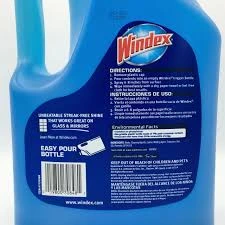
If you’re asking, what can I use to clean my TV screen, be careful Windex is not a safe choice. I’ve made this mistake before on an LCD screen, and it left marks that never went away. Windex has strong ingredients like alcohol, ammonia, and lauramine oxide, which are okay for windows but not for TV screens.
These chemicals can cause permanent damage to your OLED or LCD screen. Alcohol can wear away the screen’s coating. Ammonia can make the screen look cloudy over time.
And lauramine oxide might leave behind streaks or get into the edges of the screen. So if you’re wondering again, how does Windex affect TV screens? The short answer is it can ruin it. Use a soft cloth and a cleaner made just for TVs instead.
Can You Use Windex on Your TV Screen?
I once made the mistake of grabbing Windex from under the sink, thinking it would be a quick fix to clean the dust and smudges off my TV. I paused and thought, “Can I use Windex on my TV?” The short answer? Not a good idea. Many cleaning products, especially window cleaners like Windex, contain harsh chemicals that aren’t safe for your TV screen.
These chemicals can strip away protective coatings or even cause permanent damage. I’ve learned to avoid wondering “Can I clean my TV screen with Windex?” the hard way.
Instead, opt for a microfiber cloth and a bit of water, simple and effective. Trust me, after doing this for years, I’ve found it’s the best method. Avoid the temptation to treat your TV like a windowpane, even if the question “Can you use Windex on TV?” keeps popping into your head. It’s better to be cautious than to replace a damaged screen.
What Do Experts Say About Using Windex on TVs?
Many people ask, can you use Windex on TV screens? From my own experience cleaning TVs, I’ve learned that using Windex is not a good idea. It can harm the screen’s surface. Based on expert advice on TV cleaning, you should never use strong cleaners like Windex because they can damage the special coating on modern TV screens.
So, what do you clean a TV screen with? I’ve tried different ways and even looked at what the experts say. Michael Desjardin, a Senior Staff Writer, has reviewed and compared cleaning methods. He recommends using a soft, dry microfiber cloth or one slightly damp with water. Avoid sprays with harsh chemicals. Trust the people who have tested these methods and know what works best.
What Are the Potential Consequences of Using Windex?
I’ve seen many people try to clean their TVs with Windex, but it often causes more harm than good. One friend used it on his LCD screen, and it left streaks and weird spots. After a while, the picture looked worse, and the screen had permanent damage.
Modern TVs like OLED and LCD have soft panels that don’t mix well with harsh chemicals. Windex has alcohol and ammonia, which can slowly ruin the screen. The risks of using windex include color loss and even screen problems you can’t fix. Some people also clean too much. This over-cleaning tv can lead to damage to the tv screen, even if you think you’re being careful.
Are There Specific TV Models That Are More Sensitive?
From years of working with home electronics, I’ve seen many people mistakenly grab a bottle of Windex to clean their flat panel tv screen. It’s a common move, but one that can damage sensitive tv screens, especially the newer models. TVs today are not like the old CRT TVs, which had thick glass that could handle stronger cleaners.
Modern flat screen designs, like OLED and LCD panels, have a layer that’s much more delicate and prone to damage if cleaned incorrectly. Some might assume all TVs are the same, but in reality, lcd screen sensitivity varies greatly depending on the model.
In particular, an old TV screen is more likely to suffer from chemical damage if harsh cleaners like Windex are used. These screens are engineered for clarity and precision, but that also means they require gentle care. When I installed my first OLED, the manufacturer explicitly warned against using anything with ammonia. It’s always best to stick with a microfiber cloth and a bit of distilled water to protect your investment.
What Are the Recommended Methods for Cleaning Your TV Screen?
From my own experience dealing with smudged and spot-covered TVs after movie nights and kids’ fingerprints, I can confidently say that using Windex is not a good idea. Even though it might work on windows, a TV screen is much more delicate.
If you’re wondering how to clean a TV screen the safe way, skip harsh chemicals. The best approach? Use a microfiber cloth slightly dampened with warm water. To avoid damage while learning how to clean tv screens, always use gentle pressure and make circular motions to lift dirt instead of spreading it.
I’ve found that this works especially well on delicate surfaces when figuring out how to clean a flat screen screen. If needed, there are special screen-cleaning solutions made just for TVs. Always make sure you wipe gently and never spray anything directly on the screen. Stick with microfiber, and your TV will stay clear and safe.
What Tools Do You Need for Safe Cleaning?
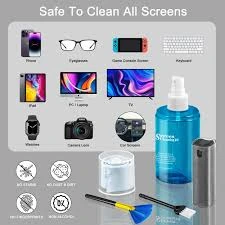
From my own experience maintaining high-end displays, Windex is a no-go when it comes to cleaning your television. The chemicals in it can damage the screen’s coating, leaving behind streaks or worse, permanent marks.
When deciding what to clean a TV screen with, your best bet is a gentle approach that avoids anything harsh. Start with a microfiber cloth, not just any rag or towel, which might scratch the surface.
My go-to has been the MagicFiber, a soft, reliable option that lifts dust without pressure. For tougher smudges, lightly dampen the cloth with warm water or, better yet, a screen-cleaning solution that’s both alcohol-free and ammonia-free.
This combo is often recommended by pros as the best television screen cleaner. Using these right tools makes all the difference and keeps your screen spotless without risking damage.
How Should You Prepare Your TV for Cleaning?
Before you start, it’s very important to prepare the tv screen for cleaning the right way. First, always power off your TV. This makes it safer and easier to see dirt or fingerprints on the screen. Then, take a soft and clean microfiber cloth. Don’t use rough clothes or paper towels because they can scratch the screen.
If the screen has smudges, you can moisten a towel with a little water or a screen-safe cleaner. Never spray anything directly on the screen. Knowing how to clean a smart tv screen helps protect it. If you’re wondering what to clean a tv screen with, always choose safe and gentle options to keep your screen clear and damage-free.
What Steps Should You Follow for Effective Cleaning?
As someone who’s dealt with everything from dusty screens to stubborn fingerprints, I’ve learned that how to clean your TV screen safely comes down to choosing the right technique and materials, not shortcuts like Windex. Using harsh cleaners can damage the sensitive surface of your TV. Instead, here’s how to wipe the LED TV screen without leaving a smudge or scratches.
First, turn off the TV and let the screen cool down. Then grab a microfiber cloth. This is the real hero here. It’s gentle enough to prevent damage but strong enough to lift grime. For tougher spots, slightly dampen a corner of the cloth with warm water, not spray directly on the screen.
I recommend wiping in circular motions rather than up-and-down swipes; it removes streaks better and helps get rid of fingerprints more effectively. Knowing how to clean a flat screen television like this doesn’t just keep it looking clean, it helps preserve its lifespan too.
What Are the Best Alternatives to Windex for Cleaning Your TV?
From personal experience working with delicate screens, I’ve learned that using Windex on a TV can actually do more harm than good. That’s why many people, including myself, look for alternatives to Windex.
If you’re wondering what to clean the TV screen with, the safest bet is always a microfiber cloth. It’s gentle, doesn’t scratch, and when paired with warm water, it works wonders without leaving streaks.
You might ask, what can you use to clean a TV screen if it’s extra grimy? There are special screen-cleaning solutions made just for this purpose. Just make sure they’re alcohol-free and ammonia-free, as those chemicals can damage the screen’s coating.
Over the years, I’ve tried all kinds of products, but nothing beats a soft microfiber cloth dampened with a bit of warm water, or a trusted alcohol-free, ammonia-free cleaner made for screens.
What DIY Solutions Can You Use Instead of Windex?
From my own experience, using Windex on a TV screen is not a good idea. It can damage the screen. A better and safe option is to make a homemade solution. Just mix a little dish soap with water (make sure it’s alcohol-free). Then use a soft microfiber cloth to wipe the screen. Explore Bungalow’s easy four-step method to keep your TV screen clean without risking damage.
This method also works if you’re trying to figure out how to clean a flat screen screen or how to clean a computer screen. Always use a screen cleaner that’s gentle and meant for electronics. Don’t spray directly on the screen. Instead, spray on the cloth and wipe gently. This helps avoid damage and keeps your screen clear and safe.
What Commercial Products Are Safe for TV Screens?
A while ago, I tried using Windex on my TV and it didn’t go well. It left streaks and made the screen look cloudy. That’s when I found out it’s important to use alcohol-free and ammonia-free screen-cleaning solutions. These are the best tv screen cleaner choices because they are safe for delicate screens.
If you’re asking, what can I clean my tv screen with, use a soft microfiber cloth like the one from MagicFiber. It works great with a proper screen cleaner and won’t scratch your TV or laptop. This is also the best way to clean a laptop screen without causing damage. I only trust these now, and they make a big difference.
How Do You Choose the Right Cleaning Solution?
If you’re wondering what you use to clean a tv screen, it’s important to know that not all cleaners are safe. I’ve made the mistake before of using regular sprays like Windex, but they can harm your screen. The best tv screen cleaner is a screen-cleaning solution that is alcohol-free and ammonia-free. These types are gentle and safe for your TV.
Always use a microfiber cloth with a good screen cleaner or cleaning agent. This keeps your screen clean without scratching or damaging it. Trust me, using the right tools makes a big difference.
How Often Should You Clean Your TV Screen?
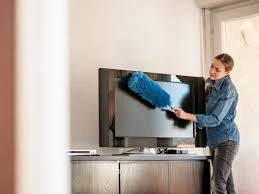
When I first got my new TV, I was obsessed with keeping it spotless, but I quickly learned that using Windex on a TV screen is not a good idea. Most modern TVs have delicate anti-reflective coatings that can get damaged by strong cleaners. Instead, I created a simple screen cleaning schedule to maintain a clean screen without harming it.
If you’re wondering about the ideal TV screen cleaning frequency, it really depends on the usage frequency and how visible the fingerprints, smudges, or grime are. In my case, with kids around constantly touching the screen, I figured out how often to clean the TV screen about once a week works best.
This keeps the content appearance sharp and vibrant, without overdoing it. For others, once every two weeks may be enough, especially if your TV isn’t in a high-traffic area. Find a wide range of TV screen cleaners and microfiber cloths on Amazon to keep your screen spotless and safe.
What Factors Affect the Frequency of Cleaning?
When you have kids at home, it’s common to see fingerprints on screen and oily palm prints after just one day. A dirty TV screen can be annoying, especially when you’re trying to enjoy bright content. If you watch TV often, these marks become more visible, so you’re watching habits can change how often you need to clean.
I’ve found that having a regular TV cleaning schedule helps a lot. Sometimes even small smudges can ruin the picture. So instead of waiting for the screen to look really messy, I clean it more often to keep it looking clear and sharp. And no, I don’t use Windex. It can damage the screen.
What Are the Signs That Your TV Needs Cleaning?
If your TV starts showing a dull image or looks unclear, that’s how you know when to clean the TV. A dirty TV screen often shows fingerprints, smudges, or a spot-covered screen that can ruin your viewing. I’ve seen this happen many times, even on my own screen the dirty appearance just makes everything less enjoyable.
When there’s grime on the screen and the appearance seems off no matter what settings you change, it means it’s time for cleaning the TV screen. But don’t use Windex, it’s too harsh and can damage the screen. Always use a soft, dry cloth or a cleaner made just for TVs.
Can Over-Cleaning Damage Your TV Screen?
Most people don’t realize it, but over-cleaning TV screens can actually do more harm than good. I’ve seen this firsthand when a friend used a regular cleaner like Windex on their OLED TV. The harsh chemicals reacted with the delicate surface, leaving streaks and dull spots that wouldn’t go away. So, can you use Windex on TV? It’s not advisable due to the risk of damaging the screen.
It wasn’t just about cleaning—it led to permanent damage. Modern screens like LCD and OLED are built with thin, fragile panels, and using excessive pressure while wiping can easily cause scratching. That kind of damage isn’t just cosmetic, it can ruin how your display looks forever.
So, how often do you clean the TV screen without risking damage? From experience, a gentle wipe with a microfiber cloth every couple of weeks is enough. If you clean too frequently, especially with force or strong cleaners like Windex, you’re not helping.
Can you use Windex on TV? Definitely not. Overdoing it weakens the surface layer and messes with the screen’s clarity. When you push down too hard or clean obsessively, you risk long-term issues that no polish can fix. For expert advice on how to clean your TV screen without causing damage, check out this CNET guide.
FAQs
What is the best glass cleaner for TV screens?
A 50/50 mix of distilled water and white vinegar works well. Avoid commercial cleaners with ammonia or harsh agents. Always apply to a cloth, not directly to the screen.
Can you clean a TV with white vinegar?
Yes, vinegar is safe when sprayed on a microfiber cloth. Gently wipe the screen and follow with a dry cloth. Do not spray vinegar directly on the TV screen.
What is the best glass cleaner for TV screens?
A 50/50 mix of distilled water and white vinegar works well. Avoid commercial cleaners with ammonia or harsh agents. Always apply to a cloth, not directly to the screen.
Can you clean a TV with white vinegar?
Yes, vinegar is safe when sprayed on a microfiber cloth. Gently wipe the screen and follow with a dry cloth. Do not spray vinegar directly on the TV screen.
